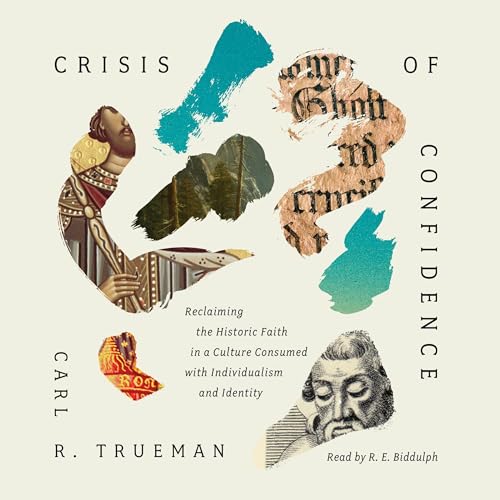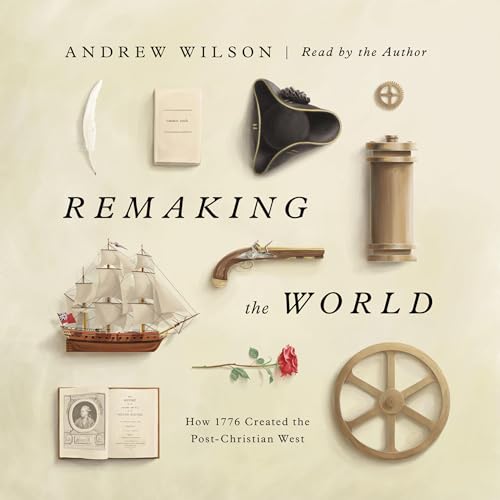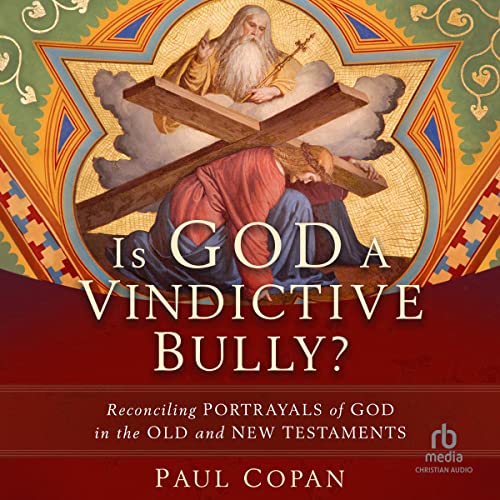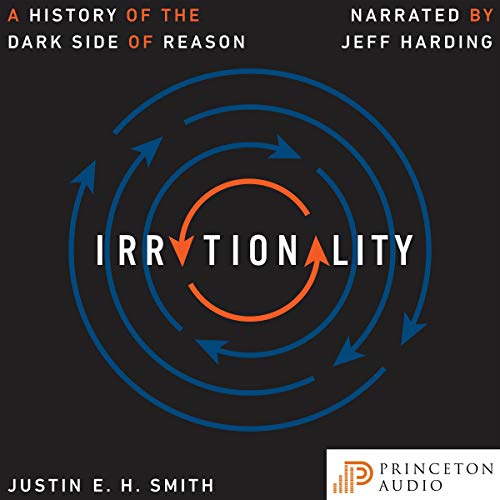$0.99/month for 3 months
$0.99$0.99
- Limited-Time Offer: Get Audible Premium Plus for $0.99 a month for the first 3 months.
- You'll receive 1 credit a month to pick ANY title from our entire premium selection to keep forever (you'll use your first credit now).
- You'll also get UNLIMITED listening to select audiobooks, Audible Originals, and podcasts.
- After 3 months, $14.95$14.95 /mo. Cancel online anytime.
 Your audiobook is waiting!
Your audiobook is waiting!
Enjoy a free trial on us
$0.00$0.00
- One credit a month to pick any title from our entire premium selection to keep (you’ll use your first credit now).
- Unlimited listening on select audiobooks, Audible Originals, and podcasts.
- You will get an email reminder before your trial ends.
- $14.95$14.95 a month after 30 days. Cancel online anytime.
One-time purchase:
-12% $18.37$18.37
 Preview
Preview The Rise and Triumph of the Modern Self: Cultural Amnesia, Expressive Individualism, and the Road to Sexual Revolution
 Audible Audiobook
– Unabridged
Audible Audiobook
– Unabridged
Modern culture is obsessed with identity.
Since the landmark Obergefell v. Hodges Supreme Court decision in 2015, sexual identity has dominated both public discourse and cultural trends — yet no historical phenomenon is its own cause. From Augustine to Marx, various views and perspectives have contributed to the modern understanding of the self.
In this timely audiobook, Carl Trueman analyzes the development of the sexual revolution as a symptom — rather than the cause — of the human search for identity. Trueman surveys the past, brings clarity to the present, and gives guidance for the future as Christians navigate the culture in humanity’s ever-changing quest for identity.
- Listening Length13 hours and 36 minutes
- Audible release dateOctober 11, 2021
- LanguageEnglish
- ASINB09GWD6ZGL
- VersionUnabridged
- Program TypeAudiobook
People who viewed this also viewed
- Crisis of Confidence: Reclaiming the Historic Faith in a Culture Consumed with Individualism and Identity
 Audible Audiobook
Audible Audiobook - Audible Audiobook
- Audible Audiobook
- Audible Audiobook
- Audible Audiobook
People who bought this also bought
- Audible Audiobook
- Audible Audiobook
- Audible Audiobook
- Audible Audiobook
- Audible Audiobook
Related to this topic
- Audible Audiobook
- Audible Audiobook
- Audible Audiobook
- Audible Audiobook
- Audible Audiobook
Product details
| Listening Length | 13 hours and 36 minutes |
|---|---|
| Author | Carl R. Trueman |
| Narrator | Carl R. Trueman, Rod Dreher |
| Audible.com Release Date | October 11, 2021 |
| Publisher | Crossway |
| Program Type | Audiobook |
| Version | Unabridged |
| Language | English |
| ASIN | B09GWD6ZGL |
| Best Sellers Rank | #10,022 in Audible Books & Originals (See Top 100 in Audible Books & Originals) #4 in Religious Ethics (Books) #5 in Church & State #7 in Religion & Philosophy (Audible Books & Originals) |
Customer reviews
Customer Reviews, including Product Star Ratings help customers to learn more about the product and decide whether it is the right product for them.
To calculate the overall star rating and percentage breakdown by star, we don’t use a simple average. Instead, our system considers things like how recent a review is and if the reviewer bought the item on Amazon. It also analyzed reviews to verify trustworthiness.
Learn more how customers reviews work on AmazonCustomers say
Customers find the book insightful and well-researched, with one review noting its excellent job articulating philosophical history. Moreover, they consider it worth the investment and important for modern Christians, with one customer highlighting its value for understanding Pope Francis's faith. Additionally, the book receives positive feedback for its timeliness and readability. However, the writing quality receives mixed reactions, with some finding it clearly written while others note it's not a light read.
AI-generated from the text of customer reviews
Customers find the book insightful, particularly praising its excellent job of articulating the philosophical history and presenting a rational narrative.
"...The historical analysis is quite fascinating, and it is challenging to start to see one's self in the pages of the text, and in what the sources..." Read more
"...In it, he aims to explore the philosophical underpinnings and social theory behind the phenomenon from the perspective of a Christian scholar...." Read more
"...In Trueman's brilliant exposition, the issue of how perceptions of selfhood have changed from Rousseau to Caitlyn Jenner forms the central strand of..." Read more
"...but any reader will be immensely benefited by Trueman's thorough cultural analysis." Read more
Customers find the book highly readable, describing it as a brilliant and absolute joy to read.
"This book was challenging and refreshing. It's a look at how the modern consciousness, our society's way of thinking, came to be...." Read more
"...way that it does and promotes certain things over others, this book is a must-read, for both Christians and non-Christians alike...." Read more
"...I highly commend this excellent book." Read more
"...It was particularly interesting reading about the influence of figures in history in fields of work that aren’t just usual philosophers,..." Read more
Customers find the book extremely informative and well-researched, with one customer noting it serves as a useful primer on Rousseau.
"...concludes by demonstrating how these developments, facilitated by technological advances, have transformed modern Western culture, specifically..." Read more
"...While not encouraging, I found this exercise to be very helpful in making sense of what is happening around us that so often confuses and confounds..." Read more
"...poets Wordsworth and Shelley. That said, while impressive in what it accomplishes, the book is often a frustrating read because of how dense..." Read more
"...He is a highly qualified academic; a serious analyst of thought from the late nineteenth century on, with cogent insights and some pointed questions..." Read more
Customers find the book worth the investment, with one noting how the author masterfully simplifies complex ideas and another mentioning it's easy to follow the logic.
"This book was challenging and refreshing. It's a look at how the modern consciousness, our society's way of thinking, came to be...." Read more
"Trueman's analysis in this work is very detailed and very thorough...." Read more
"...Trueman outlines this cultual history in this monumental work tracing the origins of expressive individualism back to Rousseau, the English Romantics..." Read more
"I bought this book upon a recommendation of a friend, it is easy to understand, and brings some new perspectives and viewpoints...." Read more
Customers find the book important for modern Christians and should read it, with one customer noting it approaches the topic from a Christian perspective.
"...Nonetheless, I consider it a must-read for all 21st-century Christian leaders." Read more
"...This was a solemn, wonderful, and joyous calling, under God; at the core of what we were meant to be...." Read more
"...Self-expression and individual psychological well-being are now at the heart of what it means to be human...." Read more
"...Carl Trueman in this book has helped me understand Pope Francis and his faith and has given me the leitmotif for my spirituality and preaching as a..." Read more
Customers find the book timely, with one describing it as a key work for understanding confusing times.
"...Truly a timely masterpiece and a wake up call to all willing to arise from slumber." Read more
"Trueman’s take on how we got to where we are is clear, compelling and timely...." Read more
"This is a very timely book which reveals how we arrived where we are now, philosophically...." Read more
"This work by Truman is an instant classic on how we got to where we are now...." Read more
Customers have mixed opinions about the writing quality of the book, with some finding it clearly written while others note it will not be an easy read.
"...Trueman does a wonderful job of remaining descriptive and objective throughout, offering commentary minimally in footnotes, and primarily in the..." Read more
"...That said, while impressive in what it accomplishes, the book is often a frustrating read because of how dense certain trains of thought in the book..." Read more
"...non-combative tone of the whole that will make this readable by people of all shades of opinion — even, perhaps, by those whose worldview stands to..." Read more
"Trueman's analysis in this work is very detailed and very thorough...." Read more
Reviews with images
identity is becoming subjective in our culture...this may be more destructive then we realize
Top reviews from the United States
There was a problem filtering reviews. Please reload the page.
- Reviewed in the United States on March 15, 2021This book was challenging and refreshing. It's a look at how the modern consciousness, our society's way of thinking, came to be.
The basic thesis: the sexual revolution is a symptom, demonstrating a larger revolution in the way society conceives of human identity, which has occurred over the last 200-300 years. The guiding question that Trueman asks is "how did our society get the place where the statement 'I am a woman trapped in a man's body' makes intuitive sense to most people?
Trueman utilizes three philosophers in his analysis: Philip Rieff, Charles Taylor, and Alasdair MacIntyre. The concepts of social imaginary (the common sense of cultural intuition legitimizing practice), mimesis and poiesis (if we conform to the world, or make it conform to us), the definition of culture (taboos), and the taxonomy of political-religious-economic-psychological men (the dominant perception of the self) are central to the analysis. The views of MacIntyre on evaluating the ethics resulting from the Enlightenment are also helpful, in correlating the distinction between Rieff's first, second, and third worlds. Both see that post-Enlightenment ethics were not based in a transcendent standard, and thus had no stability or meaning. This explains Rieff's diagnosis of modern culture as "anticulture."
Part 2 = the foundations of the revolution. Rousseau provided a psychological turn in identity, where society was that which denied authenticity and caused evil in basically good men. The Romantics and Poets took this into the popular imagination (Shelley, Wordsworth), and also focused on connecting political and sexual liberation. A combination of Nietzsche, Marx, and Darwin helped firm up an anti-essentialist view of humanity, and bid a sense of transcendent meaning adieu.
Part 3 = the sexualization of the revolution. Freud is the key figure here, providing the view of humans as fundamentally sexual creatures, defined by their sexuality and sexual desires, from birth on. This implies the sexualization of children, and the necessity of the state to protect them from repressive sexual codes. The New Left picks this up, marrying Freud and Marx in Reich and Marcuse, where repression becomes oppression, and now society must be liberated from sexual codes in order to create a class-consciousness that will bring about utopia. Tolerance carries implied disapproval, which is denial of recognition (Hegel), and thus it is oppression by denying the fundamental human dignity of a person.
Part 4 = the triumph of the revolution. This is in three parts. First, the erotic, which is analyzed in the acceptance and prevalence of pornography, as well as its implications and effects on society and people. Second, the therapeutic, where specifically gay marriage and abortion are placed in context of the revolution. Finally, the "T" in the well-known LGBTQ+ acronym, which has a divergent view of humanity than the other letters, and how it is the culmination of the revolution in its most consistent form, demanding even the abolition of the other letters.
The book concludes with some thoughts about where to go from here.
The historical analysis is quite fascinating, and it is challenging to start to see one's self in the pages of the text, and in what the sources quoted say. Trueman does a wonderful job of remaining descriptive and objective throughout, offering commentary minimally in footnotes, and primarily in the concluding section. He cites and directly quotes many sources, so that you don't need to wonder if he's making it up. It's worth every person's time to get and read this book - even if they are not Christians.
- Reviewed in the United States on April 20, 2024Product review: This product was delivered on time and in a high-quality condition as advertised.
Content review:
How did we get here?
I often ask myself this question when I encounter a seemingly counter-intuitive social movement with strong media support in Western civilization such as the current issues surrounding gender identity. In seeking to understand the movement, I came across The Rise and Triumph of the Modern Self: Cultural Amnesia, Expressive Individualism, and the Road to Sexual Revolution by Carl R. Trueman. In it, he aims to explore the philosophical underpinnings and social theory behind the phenomenon from the perspective of a Christian scholar.
“Every age has had its darkness and its dangers. The task of the Christian is not to whine about the moment in which he or she lives but to understand its problems and respond appropriately to them.”
The book’s underlying premise is that the early 21st-century ‘gender ideology’ and its current cultural infiltration are the sequelae of the late 20th-century sexual revolution which in turn is a by-product of the re-imagining of self and society that developed from 18th- and 19th-century philosophical thought.
To make his point, Trueman explores how the ideas of Jean-Jacques Rousseau, the Romanticists (Wordsworth, Shelley, and Blake), Friedrich Nietzche, and Charles Darwin contributed to the loss of innate teleology and the grounding of ethics in aesthetics. Through Sigmoid Freud and Marxist thinkers, the self was psychologized then psychology was sexualized, and finally, sexuality was politized. Trueman concludes by demonstrating how these developments, facilitated by technological advances, have transformed modern Western culture, specifically American society, with special emphasis on surrealist art and eroticism and the pornification of mainstream culture championed by Hugh Hefner.
Trueman’s framework for analysis derives significant contributions from Charles Taylor’s concepts of social imaginary, immanent frame, mimesis/poiesis and expressive individualism, Philip Rieff’s ‘third world’ social theory and his concept of the therapeutic self and ‘deathworks’, and Alasdair Mcintyre’s elaboration on emotivism as a social theory.
Given my lack of expertise on the matter, it is difficult to determine whether he definitively establishes a causal relationship between analyzed theories and the current social issues in gender identity. However, his explanation is certainly plausible and has the added benefit of making several complex philosophical works accessible to a wider audience. The author’s tone is non-neutral and as such this book cannot be readily recommended to those caught in the wave of the movement. Nonetheless, I consider it a must-read for all 21st-century Christian leaders.
Top reviews from other countries
 Paul CharbonneauReviewed in Canada on July 5, 2023
Paul CharbonneauReviewed in Canada on July 5, 20235.0 out of 5 stars Excellent
Carl Trueman clearly explains the historical long road to where we find ourselves today. His insights help to explain not only the traction that the LGBT+ movement is making today but also the lightning fast change in attitude towards end of life issues (in particular Medical Assistance in Dying.) The Church will need to depend on the grace of God and the power of the Holy Spirit to navigate through these challenges at the same time staying true to the Lord.
-
 Niklas MorganReviewed in Germany on December 8, 2021
Niklas MorganReviewed in Germany on December 8, 20215.0 out of 5 stars Sehr lesenswert!
Dieses viel zu wenig bekannte Buch ist mit Sicherheit eines der besten Philosophie bzw Psychologiebücher, die ich in den letzten Jahren gelesen habe.
Brilliante und auch faire Analyse, statt den sonst oft üblichen Polemiken und Strohmann Debatten.
Hier hat jemand gründlich gelesen und nachgedacht und er erklärt den modernen „psychologischen Menschen“. Er spannt einen grossen Bogen von der Aufklärung über die Romantik, Hegel, Marx, Nietzsche, Freud, Reich, bis zu Marcuse und den postmodernen Feministinnen und Butler.
Danach versteht man die Komplexität der aktuellen Reizthemen des aktuellen Zeitgeists, von Gender über Homoehe bis Transgender.
Erstaunlich, dass ein religiöser Theologe so analytisch fundiert die Position der Gegenseite erklären kann, ohne dabei unfair oder herablassend zu werden. Sehr bemerkenswert. Werde es aufgrund der Informationsdichte sicherlich bald nochmals lesen.
 Mike DickerReviewed in Australia on February 25, 2021
Mike DickerReviewed in Australia on February 25, 20215.0 out of 5 stars Stimulating and insightful
Loved reading this book. It draws together the many threads of cultural historical and philosophical analysis to present a balanced view of the 21st C world.
Much to ponder from this book about how to live as a disciple Christ in a way that is not only understandable to our Western neighbours but also holds out the compelling vision of life found in the gospel.
 Surrey AsaReviewed in the United Kingdom on February 21, 2025
Surrey AsaReviewed in the United Kingdom on February 21, 20255.0 out of 5 stars Brilliant. Sobering. Distressing
This book is brilliant. A thorough and scholarly piece of work tracking through history and helping the reader understand why we are where we are in terms of sexuality and gender politics. Sobering in terms of the deliberate dismantling of family and the sacred order by some. Distressing in terms of the rise of pornography and its impact (the business is bigger than Netflix).
 CjbevanReviewed in the United Kingdom on July 15, 2021
CjbevanReviewed in the United Kingdom on July 15, 20215.0 out of 5 stars the history of thought and assumption to the present construct
21 07 15 the rise and triumph of the modern self
The phrase ‘I am a woman trapped in a man’s body’ epitomises our arrival at a point in time where public discourse seems to have changed out of all semblance, not only to our past, recent and distant, but even out from a firm anchor in reality itself. This phrase previously would have been considered nonsensical, or as symptom of mental disorder, but now has credence in public life and even controversially in medicine. This has not happened overnight, nor even particularly quickly, but is the most recent manifestation of trends that have been going on for centuries. Trueman in this book describes how we have come to this point, the world of emotivism and the world of deathworks.
He traces the history of thought and assumption to the present construct of the Psychological Man of Phillip Reiff , living out the Expressive Individualism of Charles Taylor, from the Reformation, via Rousseau ; then the Romantics Wordsworth, Shelley and Blake ; and then the overtly political and iconoclastic Nietzsche, Marx, and Darwin ; and finally the politicisation of sex, of Freud being appropriated into Marxism by the Gramsci, and then the Frankfurt School firstly by such as Horkheimer and Fromm, and then Reich, Del Noce, and Marcuse . We have arrived to an anti-culture.
What emerges is a history of thought about human nature; a genealogy of the contemporary worldview which currently appears to dominate in so many ways. The present cultural conflicts are in origin presenting issues based upon conflicting world views, each with deep emotional and philosophical roots.
One thing I noticed particularly when reading out loud is that Trueman actually writes well. He shapes sentences carefully, with economy and imagination. There is not spare word in the book. There is no waffle or ambiguity. That also means that much is said, thus requiring careful thought and reflection, making this a demanding but rewarding book to read.
One recurring theme is the agreement, repeatedly, throughout the history of these ideas, of the hatred for family life. Thinkers such as Godwin considered marriage the most odious of all monopolies . The Romantics, such as Shelley, disliked the family as being confining and thus inauthentic . Marx opposed the family as bourgeois and oppressive. The New Left, such as Reich, sees the family as part of the authoritarian state, inculcating the values of the thus embedded status quo . Del Noce sees a problem in parents overseeing the sexual education of their children, since for him this is part of growing political awareness, and thus the province of the state, so the family should be dismantled . Feminists such as Simone de Beauvoir, with her loathing of motherhood, and Shulamith Firestone’s desire for universal pansexuality, the polymorphous perversity of Freud , all agree with their predecessors that the tyranny of the family must be abolished. This chimes chillingly with avowed intention of the Black Lives Matter movement to destroy hetero-normativity, and the oppressive patriarchal family.
A salutary warning at the end is that we are all living in conversation with our times and places, as much as fish live in the sea. Our churches become shaped by appeals to emotive personal stories, not historical precedent, nor rigorous theology, nor solid metaphysical foundations for decisions (hence the booing when the Bible was quoted in Synod ); a process very much part of therapeutic culture. But those in theory attempting to avoid such pitfalls can fall into therapeutic and aesthetic ways of thinking all too easily. Churches can reflect such things, even when in theory upholding a mostly orthodox faith.
This is most easily demonstrated by the elements of choice ; we choose to be Christians, then we choose to which church we go; we choose whether to attend locally, or go further afield; we choose by denomination, worship style, preaching, theology, company, or times of events; we can choose a church as if choosing a cat or a meal. Choice is the essence of the world in which we have to live and of which we are a part . We live in a world where the un-tethering of what it means to be human from any kind of metaphysical framework has rendered the notion of universal human dignity something that threatens to push the West into a kind of totalitarian anarchy .
The church must not simply imitate the world in its zero-sum confrontations, its sarcasm, and ad hominem polemics. Moral and ethical decisions must be soundly founded upon solid thought, not emotive appeals, nor attractive personas. Christianity that is authentic is dogmatic, doctrinal, and assertive, as well as compassionate . The church must function as authentic community . That community must be united in compassion, as well as in dogma, doctrine, and assertion.






















